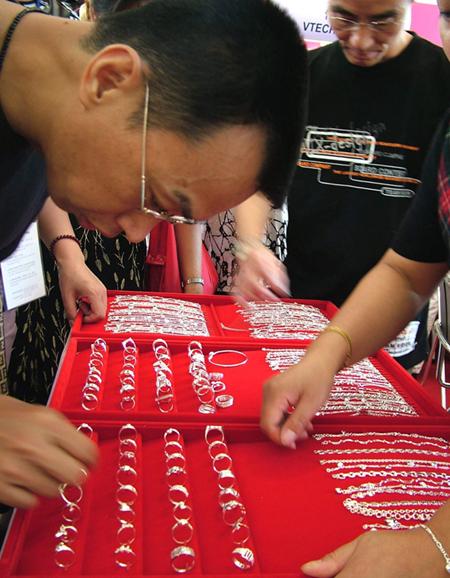
A customer examines silver jewelry at a shop in Shanghai. The number of Chinese silver investors is increasing because inflation is rising at a rate higher than the current saving deposits rate of the Chinese banks and the domestic stock market is seeing prices tumble.
The number of investors in silver has increased because of soaring gold prices but fears that the central bank will further tighten monetary policy this month could lower the value of their holdings.
The arbitrage industry has also grown because of an increase in the number of people who want to bet on relative values of domestic and overseas markets, said Jiang Shu, the senior precious metal analyst at the Industrial Bank Co Ltd. "There has been a boost in speculation in China's silver market recently," he added.
From the beginning of November, on average, every day there were three or four new large-account clients consulting the price of silver and the relative financial products, such as silver futures, said Wei Na, a bank teller from a Beijing branch of the Industrial and Commercial Bank of China (ICBC).
"Gold prices are soaring fast these days, which is expensive for individual investors. However, silver is relatively cheap, and I think it will head for growth in the future," said silver investor Zhang Qian at the ICBC branch.
"Some customers purchased physical silver, while others prefer to trade online bank-issued silver certificates - so- called paper silver," Wei said. "It is more risky for paper silver, because you can make a profit by selling it to someone wishing to own it. However, when the music stops and nobody wants to purchase it anymore, the 'paper' becomes worthless as you may not able to redeem the metal," she added.
Usually, silver prices fluctuate in line with gold, while gold prices move counter to the US dollar. The dollar was weakened after the US Federal Reserve pumped $600 billion into the sluggish economy, and the price of gold touched an all-time high of $1.424.60 on Nov 9.
"In the short term, silver prices will keep up, along with gold. But relatively, the former will fluctuate violently, which attracts investors with higher risk tolerance," Jiang said.
After China's statistics bureau announced a 4.4 percent jump in the consumer price index in October, the fastest pace in two years, speculation that the government may take additional moves to curb inflation spurred commodities prices.
The People's Bank of China on Wednesday said it will raise the required reserve ratio for all lenders by 50 basis points, its fourth increase this year. The move, which requires lenders to set aside part of their deposits as reserves, will take effect on Nov 16 and is expected to absorb liquidity of about 300 billion yuan ($45.1 billion).
The rise in the required reserve ration, along with an increase in the benchmark one-year lending rate by 0.25 of a percentage point to 5.56 percent, indicates the government's intention to fight inflation, according to a report from Shanghai CIFCO Futures Co Ltd. China will turn the current moderately loose monetary policy into one that is more moderate, which will drive commodity prices lower in the near future, said the report.
The leaders of the 20 major economies in Seoul last week reached a consensus to move toward a more legitimate and effective International Monetary Fund (IMF). Their communiqu said IMF reform will enhance the voices and interests of emerging markets. That will, the report said, to some extent, stabilize the dollar as the world reserve currency, which means the price of precious metal prices may be sluggish in the short term.





